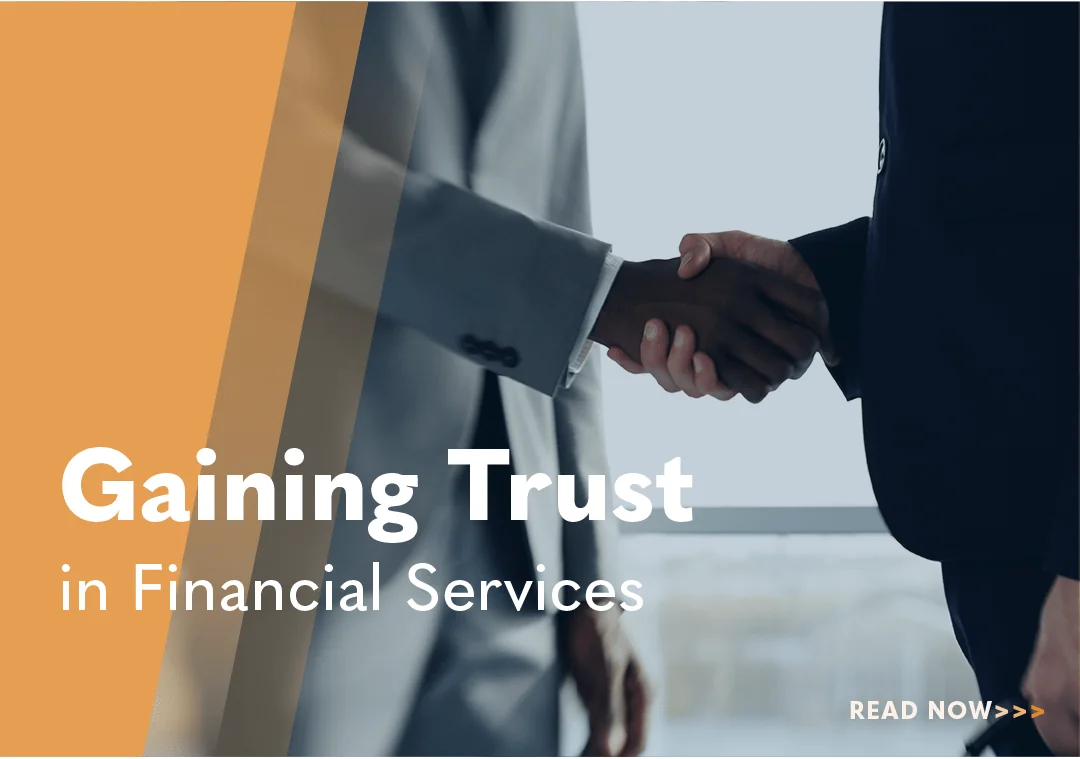Gaining Trust in Financial Services

You don’t need to be J.P. Morgan to predict that higher interest rates will lead to more expensive borrowing, increased uncertainty, and credit risks that we haven’t seen in over a decade. When markets become uncertain, resources are managed more cautiously. For bankers, financial advisors, and business development officers, generating new business becomes more complicated. Consequently, a sense of trepidation hangs in the air for financial advisory professionals with a performance-based compensation plan. This article explores how financial professionals and their organizations can continue to drive new business forward and deliver on their targets.
Across the financial industry, low interest rates and stimulus combined with the Paycheck Protection Program (PPP) have spurred demand that did not require colossal business development efforts. When the market is booming, business development skills decline. The comfort of sitting at your desk and answering the phone for new business creates an “order taker” mindset. Sourcing new business today starts with recovering from the order taker mentality.
Back to the Basics
A mentor once advised me, “Anyone can sell when they are the least expensive.” Customers always select the least expensive option when there is no perceived difference. Differentiating your service and aligning those services with what is strategically important to clients is key to maintaining margins. Differentiation is a word every challenger will boast about, but only champions deliver.
When demand softens, competition increases. This added pressure creates the “sharp pencil” approach to getting a deal done. A common predicament financial service professionals find themselves in is the fear of losing a potential client if they do not cut the rate or match a competing offer. Consider this example:
A commercial loan officer has been working with a potential major client for months. Late in the process, the loan officer feels vulnerable to losing the client and any chance at long-term business if they do not cut their rate. They “sharpen their pencil” and grant the concession, but the client never blossoms into a significant account. That foreboding feeling of losing the business distorted the loan officer’s judgment.
That feeling of vulnerability is counterproductive and can be avoided, even in a slow market. There is a tendency in down markets to be accommodating and obliging to their detriment. The assumption is that by granting concessions, customers will value the commitment. However, being quick to “sharpen the pencil” often has the opposite effect on the client and diminishes the client’s perceived value. Concessions granted flippantly are viewed as customary. Things that are customary are rarely highly valued.
Confidence Creates Value
What causes that vulnerable feeling among financial professionals? First, we only feel vulnerable when we lack confidence in our offer. Confidence and differentiating are interconnected. The opposite of differentiate is to resemble. If we believe, consciously or unconsciously, that our services resemble the bank across the street, we will never feel confident in our offer. Remember, the least expensive option is selected when all things are equal. Failure to differentiate is a primary cause of feeling vulnerable and makes competing on price the only option.
The second cause of feeling vulnerable is the lack of pipeline. How do you make a bad loan? Most likely by having nothing else in your pipeline. Confidence is a natural byproduct when you know you have a full pipeline. Suppose professionals spend as much time on their pipeline as researching markets; imagine all the revenue that would be captured. When demand softens, and the pipeline dries up, every deal can feel like it’s make or break. To increase the confidence of financial professionals, financial organizations can benefit by ensuring their team excels at differentiating and building their pipeline.
Confidence is a mindset that creates value and is critical to success. When clients view your offers as so unique that going with anyone else would be a mistake, there is no reason to discount. Customers want advice on what is strategically important and assurance that the guidance will help them succeed.
Status Quo Chokes Performance
During a downturn, average leaders repeat the same script, build strong relationships, understand the customer’s needs, are proactive, and follow the process. Stating the obvious is not the same as challenging the status quo. The status quo is a problem for many organizations and leaders. When individuals or organizations habitually miss achieving their financial goals, a mindset of acceptability is created.
As a performance training company, we’ve identified common reasons for financial service organizations to resist change and continue with the status quo longer than they should. First, they view change as admitting failure. It’s one thing for market conditions to change and performance to suffer. It is something else for leaders to think they will be blamed for causing the problem. Leaders will defend their position like General Custer at Little Big Horn, with disastrous results.
Connected with the stigma of failure and blame is the “We can do this ourselves” mentality.” In a downturn, this is how it typically unfolds: Leadership creates a new plan to (1) grow core deposits, (2) cross-sell, and (3) create a new incentive program. After 12 months, they are in the same position they started. Creating a list of tactics is a simple step. As Sun Tzu said, “Tactics without strategy is the noise before defeat.”
Mindset Over Tactics
Readers might be thinking, “I thought this article was on generating new business. Where are the specifics?” When borrowing or investing a large sum of money, most consumers seek assurance that by following professional advice, they will succeed. At Janek, we call this individual a trusted advisor.
The best-selling business author, Seth Godin wrote, “People don’t believe what you tell them. They rarely believe what you show them. They often believe what their friends tell them. They always believe what they tell themselves.”
Mr. Godin points out that the question customers want answered is, “Can I trust you?” Until trust is established, no actions happen.
The disconnect between what customers trust and how companies build trust is enormous. Financial advisors try to “prove” their trustworthiness with facts, verification, and credentials. Meanwhile, customers make decisions based on a recommendation, a few minutes on the phone, and how they feel during the meeting.
This disconnect is a primary cause of low performance among financial professionals. It’s not that the loan officers or financial advisors are not trustworthy. The problem is that trustworthy professionals are failing at transferring trust. Consequently, they are not making the impact they are capable of with their clients. This subtle but significant detachment is a hidden roadblock to performance improvement.
Traditional sales training fails to deliver the desired long-term performance improvements in the financial industry because the training is based on tactics. “I’ll show you exactly what worked for me” is a common approach. The premise is that if we copy the tactics, we can duplicate the results. We believe financial service professionals will be more successful by adopting a trusted advisor mindset and have to rely less on tactics. Said another way, instead of acquiring new tactics, become a trusted advisor.
In Conclusion
In an environment where fake news is the primary headline, the value of trust is at an all-time high. Soundbites are cheap, and sales pitches are sleazy. They do not work because they are on a superficial level of communication. What matters most to customers is not what companies say but how they make them feel.
Clients want to be viewed as more than walking wallets. They want to feel confident that their advisor can help them accomplish their long-term vision. In all client/advisor relationships, confidence is the precursor to trust. Financial professionals can be confident in securing new business in any market when they are viewed as trusted advisors.

- Account Planning (11)
- Awards (55)
- Client Testimonial (38)
- Personal Branding (19)
- Podcast (12)
- Research (70)
- Sales Career Development (85)
- Sales Coaching (157)
- Sales Consulting (133)
- Sales Culture (164)
- Sales Enablement (350)
- Sales Leadership (111)
- Sales Management (244)
- Sales Negotiation (16)
- Sales Prospecting (120)
- Sales Role-Playing (19)
- Sales Training (237)
- Selling Strategies (256)
- Soft Skills (68)
- Talent Management (92)
- Trusted Advisor (28)
- Virtual Selling (42)
- Webinar (12)
































